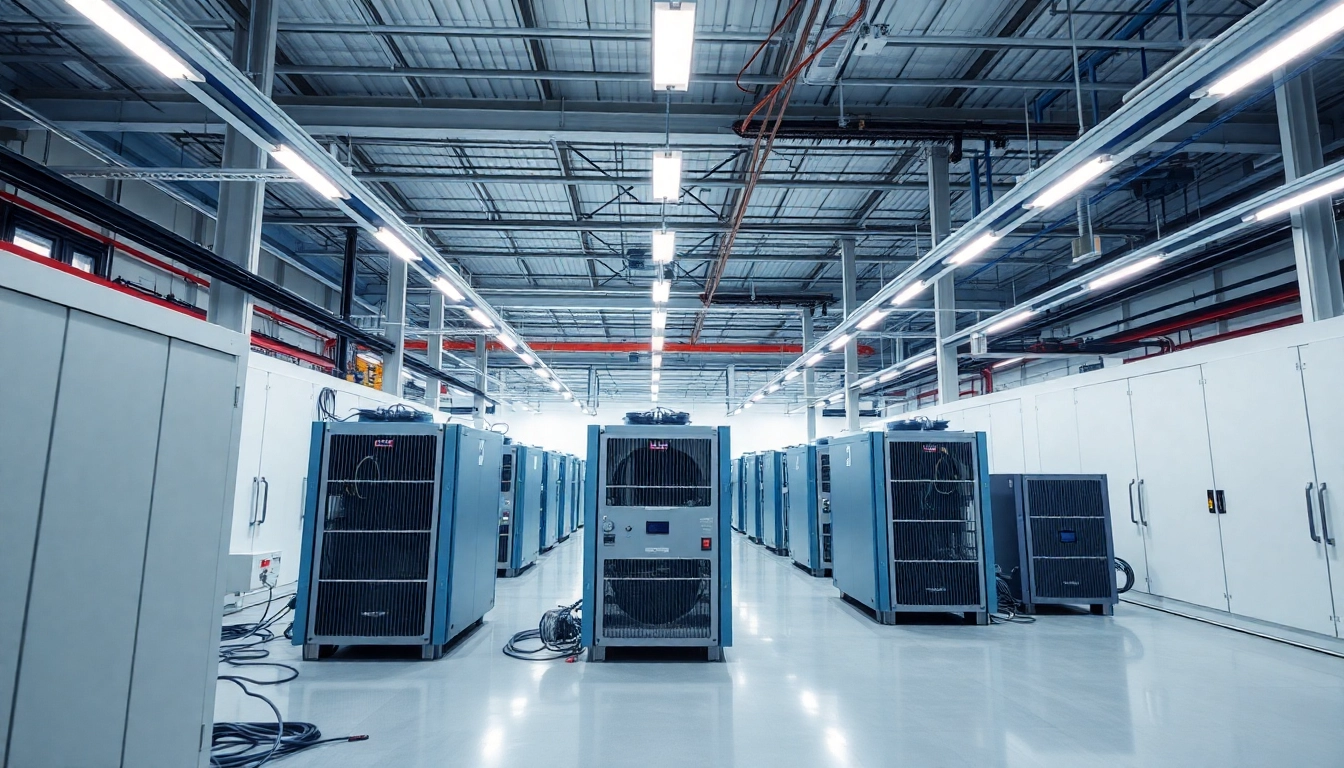Understanding Power Supply Manufacturers
The power supply unit (PSU) is a crucial component in any electronic system, providing the necessary electrical power to support the operation of various devices. For consumers and businesses alike, choosing a reliable and efficient Power Supply Manufacturer is paramount. This article delves into the ins and outs of power supply manufacturers, breaking down types of power supplies, essential features, and current market trends that shape the industry.
Overview of Power Supply Types
Power supply units come in several types, each catering to specific needs and applications. Here’s a look at the most common types:
- AC-DC Power Supplies: These convert alternating current (AC) from the wall into direct current (DC) required by electronic equipment. AC-DC supplies are typical in laptops, televisions, and other household devices.
- DC-DC Converters: Used to convert one DC voltage level to another, these are integral in situations where devices require different voltage levels than provided.
- Switching Power Supplies: These use high-frequency transistors to convert power with improved efficiency. They are lighter, smaller, and more efficient than traditional linear power supplies, making them a popular choice in modern applications.
- Linear Power Supplies: Although less common now, linear power supplies offer low-noise outputs, making them suitable for sensitive audio applications.
- Uninterruptible Power Supplies (UPS): These devices provide emergency power during outages, preserving data and allowing for a graceful shutdown of systems.
Key Features of Quality Power Supplies
When evaluating power supply manufacturers, understanding certain key features can greatly influence the effectiveness of the power supply. These include:
- Efficiency Ratings: Rated in percentage terms, a higher efficiency translates into less energy waste and lower electricity bills. Most quality power supplies should have an efficiency rating of 80% or above, ideally verified by certification standards such as 80 PLUS.
- Form Factor: The size and shape of the power supply must fit within the housing of your device. Common form factors include ATX for desktops and smaller designs for laptops and embedded systems.
- Modularity: A modular power supply allows users to connect only the cables needed for their setup, reducing clutter and enhancing airflow within the case.
- Power Ratings: Consideration of total output power and individual rail outputs becomes crucial, especially for high-performance systems that require stable and adequate power delivery.
- Protection Features: Quality power supplies come equipped with various protection mechanisms such as over-voltage protection (OVP), under-voltage protection (UVP), short circuit protection (SCP), and over-temperature protection (OTP) to prevent component damage.
Market Trends and Demands
The power supply market is ever-evolving, driven by technological advancements and increasing consumer demands. Several current trends can be observed:
- Sustainability: With rising environmental awareness, companies are pushing for more efficient power supplies that consume less power and generate less waste. This is reflected in the growing demand for power supplies that conform to energy efficiency standards.
- Integration with Renewable Energy: As renewable energy systems gain traction, power supplies must adapt to interface with solar panels and battery systems, leading to a demand for hybrid power solutions.
- Rise of IoT Devices: The proliferation of Internet of Things (IoT) devices has led to a requirement for compact, energy-efficient power supplies capable of supporting a vast array of interconnected devices.
- Increased Demand for Custom Solutions: As industries evolve, many power supply manufacturers are catering to bespoke solutions, emphasizing customization to meet specific application needs.
Top Players in the Power Supply Market
Leading Power Supply Manufacturers
The power supply industry has several notable manufacturers known for their quality and innovation. Key players include:
- Corsair: Known for gaming and high-performance computing products, Corsair offers a variety of PSU ranges that appeal to different segments, boasting high efficiency and modular designs.
- Seasonic: Considered one of the best manufacturers for reliability, Seasonic provides high-quality units with solid warranty terms and excellent performance metrics.
- EVGA: Popular among gamers, EVGA’s products often boast exceptional cooling systems and robust support, making them a go-to choice for many enthusiasts.
- Mean Well: This company fills a unique niche in industrial power supplies and has a strong reputation for its reliable products that cater to custom and standard requirements.
- FSP Group: As a global leader, FSP offers a comprehensive product range, focusing on energy efficiency and advanced power supply solutions for both consumer and industrial sectors.
Brand Reputation and Customer Trust
In an industry where reliability is essential, brand reputation significantly influences customer choices. Renowned manufacturers often have rigorous testing protocols and standards that maintain quality control. Customer trust is built through:
- Positive User Reviews: Online reviews, user forums, and testimonials provide valuable insights into a manufacturer’s quality and reliability.
- Certifications: Certifications such as ISO 9001 or ENERGY STAR signify adherence to industry quality and efficiency standards, bolstering customer confidence.
- Warranty and Customer Service: A manufacturer offering comprehensive warranties and responsive customer support is likely to garner more trust from potential buyers.
Comparing Specifications and Pricing
When selecting a power supply manufacturer, comparative evaluation of specifications and pricing models is essential. This involves:
- Price vs. Feature Set: It’s vital to weigh the price against the features offered. A cheaper PSU may lack the necessary protections or efficiency ratings.
- Compatibility: Ensure that power ratings, connector types, and overall efficiency agree with the requirements of your specific build or application.
- Benchmarking: Performance benchmarks from independent reviews assist in comparing the effectiveness and reliability of competing models, informing better purchasing decisions.
Choosing the Right Power Supply
Assessing Power Needs for Different Applications
Understanding power needs is the cornerstone of choosing the right power supply. Various applications demand different power capacities. Here are some considerations:
- Gaming PCs: High-end gaming setups require more power to accommodate powerful GPUs and CPUs, generally needing power supplies in the 600W-1000W range depending on the components.
- Office Setups: Typical office setups do not require extensive power and usually fall into the 300W-600W range, making energy efficiency a priority.
- Industrial Applications: Equipment used in industrial settings may require specialized power supplies with higher ratings and robustness to handle extreme conditions.
Evaluating Efficiency Ratings
Efficiency ratings are critical not only for performance but also for environmental impact. When choosing a power supply:
- Consider the 80 PLUS Certification: Look for power supplies that have an 80 PLUS certification, which implies they are over 80% efficient at specified load levels.
- Analyze Power Factor: A power factor rating of 1 means perfect efficiency, while ratings below indicate some losses in the power supply conversion process.
- Look for Load Variation: A power supply should maintain high efficiency across its load range, ensuring consistent performance during various operational conditions.
Understanding Warranty and Support Options
Warranties and customer support are often indicative of a manufacturer’s confidence in their product’s longevity and reliability. When selecting a manufacturer, consider:
- Warranty Duration and Terms: Longer warranties with comprehensive coverage suggest a commitment to quality.
- Customer Support Accessibility: Evaluate the ease of access to customer service; manufacturers with robust support channels (phone, email, online chat) are generally more trustworthy.
- Return Policy: A fair return policy allows for testing of the PSU without heavy penalties, providing peace of mind for customers.
Emerging Technologies in Power Supply Manufacturing
Innovations in Renewable Energy Systems
As the need for renewable energy solutions grows, power supply manufacturers are innovating to integrate solar and wind energy systems. Considerable advancements include:
- Grid-Tie Inverters: These convert the energy produced by solar panels into a form usable by the electrical grid, optimizing energy flow and increasing efficiency.
- Battery Storage Solutions: Integrating power supplies with battery systems ensures energy is available during peak usage or outages, allowing for better energy management.
- Smart Grid Integration: Power supplies are becoming crucial in the development of smart grids, featuring capabilities like remote monitoring and management to enhance efficiency.
Smart Power Supplies and IoT Integration
The rise of the Internet of Things (IoT) is impacting power supply technology significantly. Trends involve:
- Remote Monitoring: Smart power supplies can be monitored and controlled remotely, enabling users to track energy consumption and performance data.
- Adaptive Power Distribution: IoT-integrated power supplies can adjust their output based on real-time data collected from connected devices, enhancing efficiency.
- Predictive Maintenance: Utilizing AI and machine learning, smart power supplies can predict failures and maintenance needs before they occur, reducing downtime and increasing reliability.
Future Trends in Power Management Solutions
Looking ahead, several trends are emerging in power management that will shape the future of power supply manufacturing:
- Advancements in Energy Storage Technologies: As energy storage becomes more critical, innovations like solid-state batteries may change how power supplies operate.
- Increased Focus on Cybersecurity: With smart power supplies becoming more connected, cybersecurity measures to protect against hacks and data breaches will be paramount.
- Sustainability Initiatives: The ongoing push for eco-friendly practices in manufacturing will lead suppliers to adopt greener technologies and recycling practices.
Best Practices for Selecting Power Supply Manufacturers
Conducting Thorough Research
When choosing a power supply manufacturer, thorough research is essential to ensure quality and reliability. This includes:
- Reading Reviews: Utilize online forums, review sites, and trusted tech blogs to gather insights from current users about their experiences with specific brands and models.
- Comparative Analysis: A comprehensive side-by-side comparison of features, specifications, and price points can aid in making an informed decision.
- Industry Reports: Consult industry reports and white papers that evaluate power supply manufacturers based on performance metrics and trends.
Reading Customer Reviews and Case Studies
Understanding how a product performs in real-life scenarios can prevent potentially costly mistakes. Key steps include:
- User Feedback: Engaging with user communities (like Reddit or specialized forums) can provide insights into the long-term performance of various power supplies.
- Case Studies: Companies often publish case studies that highlight successes and challenges, providing a deeper understanding of how different power supplies perform in the field.
- Rating Calculators: Some sites offer calculators that factor in user ratings and expert reviews to generate an overall score for PSU performance.
Networking with Industry Experts
Building connections within the industry can yield valuable insights. Effective strategies include:
- Attending Trade Shows: Industry events allow for direct interaction with manufacturers and their products, providing hands-on experience and the chance to ask questions.
- Online Forums and Social Media: Join online communities focused on PC building or industrial technology for informal advice from experienced users and professionals.
- Consulting with Experts: If significant investments are being made, consider hiring a consultant or industry expert to provide tailored advice based on specific needs and application scenarios.



